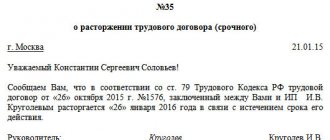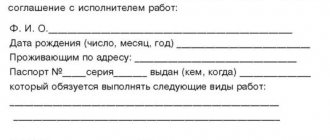Basic guarantees upon termination of an employment contract
An employee dismissed for one reason or another has the right to receive monetary compensation from the employer for all those vacations that were not spent by him during the period of his working activity.
Before an employee resigns, upon his written request, he has the right to demand all vacations , even if after them he terminates the employment contract on his own initiative.
Unserved leave can be granted to an employee even if the term of his employment contract has come to an end . At the same time, the last day of this leave will be considered the day of his dismissal in the same way as in the previous paragraph.
A citizen has the right to receive benefits for temporary disability if it occurs on the last day of his direct work activity.
Providing guarantees and compensation to workers
Labor legislation establishes general guarantees and compensation that apply when concluding an employment contract, transfers, deductions from wages, as well as special cases of such privileges.
Guarantees and compensation are provided in the following cases:
- business trip;
- fulfillment of assigned state or public duties;
- moving to work in another area;
- combining work with education;
- forced termination of the agreement through no fault of the employee;
- annual leave;
- in some cases, termination of the employment agreement;
- violation of deadlines for issuing a work book is not the fault of the dismissed employee;
- in other cases established by law, collective or labor agreement.
Additional guarantees
For a certain category of citizens, additional guarantees are provided upon termination of an employment contract. For example, this applies to pregnant women and people with family responsibilities.
Termination of an employment contract with a pregnant woman is allowed only if the activities of the individual entrepreneur are terminated. This is provided that the initiative comes from the employer. If the term of an employment contract is terminated during a woman’s pregnancy, the employer must extend it until the end of the pregnancy.
There are, of course, conditions under which a pregnant woman can be fired . For example, if she was hired only for the period of filling a separate position. Accordingly, when the main employee returns, the employment contract must be terminated. Or, if a pregnant woman committed a guilty act during the performance of her duties, she is also subject to dismissal.
Article 178. Severance pay
Upon termination of an employment contract due to the liquidation of an organization (clause 1 of part one of Article 81 of this Code) or a reduction in the number or staff of the organization’s employees (clause 2 of part one of Article 81 of this Code), the dismissed employee is paid severance pay in the amount of the average monthly salary, as well as for he retains the average monthly salary for the period of employment, but not more than two months from the date of dismissal (including severance pay).
Severance pay in the amount of two weeks' average earnings is paid to the employee upon termination of the employment contract due to:
the employee’s refusal to transfer to another job, which is necessary for him in accordance with a medical report issued in the manner established by federal laws and other regulatory legal acts of the Russian Federation, or the employer’s lack of relevant work, calling the employee up for military service or sending him to an alternative civilian service that replaces it service;
reinstatement of the employee who previously performed this work;
Articles on the topic (click to view)
- What to do if the employer does not give the employment contract
- What is the difference between a collective agreement and an employment contract?
- Apprenticeship contract with an enterprise employee: sample 2020
- Terms of remuneration in an employment contract: sample 2020
- Go on maternity leave from the labor exchange
- Notice of extension of a fixed-term employment contract: sample 2020
- Notice of termination of a fixed-term employment contract: sample 2020
the employee’s refusal to be transferred to work in another location together with the employer;
recognition of the employee as completely incapable of working in accordance with a medical certificate issued in the manner established by federal laws and other regulatory legal acts of the Russian Federation;
the employee’s refusal to continue working due to a change in the terms of the employment contract determined by the parties.
An employment contract or collective agreement may provide for other cases of payment of severance pay, as well as establish increased amounts of severance pay.
Article 179. Preferential right to remain at work in the event of a reduction in the number or staff of employees
When the number or staff of employees is reduced, priority right to remain at work is given to employees with higher labor productivity and qualifications.
With equal labor productivity and qualifications, preference in remaining at work is given to: family - in the presence of two or more dependents (disabled family members who are fully supported by the employee or receive assistance from him, which is their constant and main source of livelihood); persons in whose family there are no other independent workers; employees who received a work injury or occupational disease while working for this employer; disabled people of the Great Patriotic War and disabled people fighting in defense of the Fatherland; employees who improve their qualifications in the direction of the employer without interruption from work.
Article 180. Guarantees and compensation to employees in the event of liquidation of an organization, reduction of the number or staff of employees of the organization
When carrying out measures to reduce the number or staff of an organization's employees, the employer is obliged to offer the employee another available job (vacant position) in accordance with part three of Article 81 of this Code.
Employees are warned by the employer personally and against signature at least two months before dismissal about the upcoming dismissal due to the liquidation of the organization, reduction in the number or staff of the organization's employees.
Expert opinion
Lebedev Sergey Fedorovich
Practitioner lawyer with 7 years of experience. Specialization: civil law. Extensive experience in defense in court.
Article 181. Guarantees to the head of the organization, his deputies and the chief accountant upon termination of the employment contract due to a change in the owner of the organization’s property
In the event of termination of the employment contract with the head of the organization, his deputies and the chief accountant in connection with a change in the owner of the organization’s property, the new owner is obliged to pay compensation to the specified employees in the amount of not less than three average monthly earnings of the employee.
41. Labor discipline. Legal regulation of internal labor regulations.
Labor discipline is obligatory for all employees to obey the rules of conduct determined in accordance with the Labor Code of the Russian Federation, other laws, collective agreements, agreements, employment contracts, and local regulations of the organization. Labor discipline is a system of measures and means to establish, comply with and ensure the internal labor regulations of an organization. Methods of strengthening labor discipline are persuasion, encouragement, coercion (i.e. disciplinary action). The organization's labor regulations are determined by the internal labor regulations. Legal regulation of internal labor regulations is carried out on the basis of Chapter. 29 and 30 of the Labor Code of the Russian Federation. The internal labor regulations of an organization are a local regulatory act that regulates, in accordance with the Code and other federal laws, the procedure for hiring and dismissing employees, basic rights, responsibilities, responsibilities of the parties to an employment contract, working hours, rest periods, incentives and penalties applied to employees, and as well as other issues of regulation of labor relations in the organization. The internal labor regulations of the organization are approved by the employer, taking into account the opinion of the representative body of the organization's employees. In accordance with the previously valid Code, the rules were approved by the general meeting of the labor collective. The employer is obliged to familiarize the employee with the internal labor regulations in force in the organization when hiring him (Article 68 of the Labor Code of the Russian Federation). Internal labor regulations must be available for employees to review. For certain categories of employees, there are charters and regulations on discipline approved by the Government of the Russian Federation in accordance with federal laws. Charters and regulations on discipline apply in those industries (areas of activity) where strict adherence to labor discipline is especially important due to the fact that its violation can entail extremely serious consequences.
42. Concept and types of disciplinary liability. The procedure for applying disciplinary sanctions.
Disciplinary liability of employees is one of the types of legal liability that is provided for by law for unlawful behavior. Disciplinary liability is the employee’s obligation to bear the punishment provided for by labor law for unlawful failure to fulfill his or her job duties. The basis for bringing to disciplinary liability is a disciplinary offense. A disciplinary offense is the failure or improper performance by an employee, through his fault, of the work duties assigned to him. A disciplinary offense has a set of characteristics, has a subject, a subjective side, an objective side, and an object.
It is important to know: What documents are required to conclude an employment contract
Labor legislation provides for the following disciplinary sanctions: reprimand, reprimand, dismissal on appropriate grounds (Article 192 of the Labor Code of the Russian Federation).
The procedure for applying disciplinary sanctions established by Art. 193 of the Labor Code of the Russian Federation, mandatory for all employers. The right to impose a disciplinary sanction on an employee belongs to the employer. The head of the organization can speak on his behalf. Other persons have this opportunity if this is provided for in the organization’s charter or they are specifically authorized by the employer. Disciplinary sanctions in the form of dismissal can be imposed only by those persons who have been granted the right to hire and fire. Before imposing disciplinary action, the employer must request a written explanation from the employee. If the employee refuses to give an explanation, a corresponding report is drawn up. The employee’s refusal to provide an explanation does not exempt the perpetrator from disciplinary action. When imposing a disciplinary sanction, the employer is obliged to take into account the severity of the offense committed, previous work, the behavior of the employee, and the circumstances under which the offense was committed. It is not necessary to apply penalties in the sequence in which they are located in Art. 192 Labor Code of the Russian Federation.
43. Professional training, retraining and advanced training of employees. Guarantees for employees combining work with training. Article 196. Rights and obligations of the employer for training and retraining of personnel
The need for professional training and retraining of personnel for its own needs is determined by the employer. The employer provides professional training, retraining, advanced training of employees, teaching them second professions in the organization, and, if necessary, in educational institutions of primary, secondary, higher vocational and additional education on the terms and conditions in the manner determined by the collective agreement, agreements, employment contract. Forms of professional training, retraining and advanced training of workers, the list of required professions and specialties are determined by the employer, taking into account the opinion of the representative body of workers in the manner established by Article 372 of this Code for the adoption of local regulations. For employees undergoing vocational training, the employer must create the necessary conditions for combining work with training, provide guarantees established by labor legislation and other regulatory legal acts containing labor law norms, a collective agreement, agreements, local regulations, and an employment contract. Article 197. Employees’ rights for vocational training, retraining and advanced training Workers have the right to vocational training, retraining and advanced training, including training in new professions and specialties. This right is exercised by concluding an additional agreement between the employee and the employer. Article 173. Guarantees and compensation for employees combining work with training in educational institutions of higher professional education, and employees entering these educational institutions. Employees sent for training by the employer or who independently entered educational institutions of higher professional education with state accreditation, regardless of their organizational and legal forms, in part-time and part-time (evening) forms of education. For those successfully studying at these institutions, the employer provides additional leave while maintaining average earnings for:
passing intermediate certification in the first and second years, respectively - 40 calendar days, in each of the subsequent courses, respectively - 50 calendar days (when mastering the main educational programs of higher professional education in a shortened time in the second year - 50 calendar days); preparation and defense final qualifying work and passing final state exams - four months; passing final state exams - one month. The employer is obliged to provide leave without pay to: employees admitted to entrance examinations in educational institutions of higher professional education - 15 calendar days; employees - students preparatory departments of educational institutions of higher vocational education for passing final exams - 15 calendar days; employees studying in state-accredited educational institutions of higher vocational education for full-time study, combining study with work, for passing intermediate certification - 15 calendar days per academic year, for preparing and defending the final qualifying thesis and passing the final state exams - four months, for passing the final state exams - one month. For employees who successfully study by correspondence in educational institutions of higher professional education with state accreditation, the employer pays once per academic year travel to the location of the relevant educational institution and back. For employees studying part-time and part-time (evening) forms of study in educational institutions of higher professional education with state accreditation for a period of ten academic months before starting a diploma project (work) or passing state exams a working week shortened by 7 hours is established at their request. During the period of release from work, these employees are paid 50 percent of the average earnings at their main place of work, but not less than the minimum wage.
By agreement of the parties to the employment contract, working hours are reduced by providing the employee with one day off from work per week or by reducing the duration of the working day during the week. Guarantees and compensation for employees who combine work with study in educational institutions of higher professional education that do not have state accreditation are established collective agreement or employment contract.
44. Labor protection. Occupational safety requirements.
Occupational safety in the broad sense of the word is a system for preserving the life and health of workers in the process of work, which includes legal, socio-economic, organizational and technical, sanitary and hygienic, treatment and preventive, rehabilitation and other measures. Labor protection as an institution of labor law is a set of norms aimed at ensuring working conditions that are safe for the life and health of workers. As a legal institution, labor protection includes standards establishing the rights and obligations of workers and employers on issues of occupational safety and health, as well as specifying them through rules and instructions on labor protection; special rules on compensation for persons working in difficult, harmful or dangerous conditions; standards on labor protection for women, minor workers, and persons with reduced ability to work; standards governing the organization of labor protection work; rules for investigating and recording industrial accidents. Occupational safety has social, economic and legal significance. The social significance of labor protection is that labor protection helps to strengthen (preserve) the health of workers from harmful and dangerous production factors. The economic importance of labor protection is realized in the growth of labor productivity, economic recovery, and increased production. The legal significance of labor protection consists in the legal regulation of work according to ability, taking into account the severity of working conditions, the physiological characteristics of the female body, the body of adolescents and the working ability of disabled people. In addition, labor safety issues are the object of organizational and managerial relations between the labor collective (the corresponding trade union body) and the employer, as well as social partnership relations at the federal, industry, and regional levels. The legal regulation of labor protection widely combines centralized norms of labor legislation, which establish a minimum of legal measures for labor protection, with a contractual method that increases and specifies this minimum on the basis of agreements, collective agreements, and employment contracts. Article 37 of the Constitution of the Russian Federation declares that everyone has the right to work in conditions that meet safety and hygiene requirements. The main regulatory acts on labor protection are: Fundamentals of legislation on the protection of the health of citizens, the Labor Code of the Russian Federation, the Federal Law “On the Fundamentals of Labor Safety in the Russian Federation”, other regulatory legal acts adopted by the President of the Russian Federation, the Government of the Russian Federation, the Ministry of Labor and Social Development of the Russian Federation, specialized federal inspectorates for supervision of labor protection (Goskomsanepidnadzor, Gosgortekhnadzor, etc.). Currently, unified industry and interindustry rules on safety and industrial hygiene are in force, many of which, in order to unify labor protection requirements, have been taken into standards, and a federal and industry system of occupational safety standards has been developed.
It is forbidden to fire
Termination of an employment contract with the following categories of citizens is not allowed:
- Dismissal of workers with temporary disability, pregnant women, or those women who have children under 3 years of age.
- Employees under the age of 18 are not subject to dismissal.
- If the employee is a member of a trade union organization, his dismissal is also unacceptable.
- Workers participating in collective bargaining or resolving a labor dispute.
In any case, no matter on whose initiative the employment contract is terminated, it is best, when terminating it, to seek help from a specialist who can provide qualified assistance in terminating it. At the same time, we can say with confidence that all guarantees upon termination of the employment contract and legal rights will be respected.
Features of staff reduction
The staff reduction procedure is carried out according to certain rules. Guarantees and compensation for termination of an employment contract in this case are determined by Art. 180 Labor Code of the Russian Federation. First of all, employees who are highly qualified and efficient are retained. If these indicators are equal, then the advantage is given:
- people who support two or more dependents;
- the only worker in the family;
- persons with occupational injuries and illnesses;
- disabled people of the Second World War;
- persons who have improved their qualifications at the expense of the employer.
When a business closes, all employees must be notified in writing two months before the expected closure date. The employer has the right to terminate the contract subject to payment of financial assistance. No changes were made to the Labor Code regarding guarantees and compensation for dismissals in 2020.
Issues with severance payments to managers are regulated separately. The main reason for their dismissal is a change in the ownership of the organization's property. In this case, the new owner is obliged to pay three average monthly earnings.
Initiative from both sides
When reducing the company's core workforce, preference is given to qualified and experienced employees with greater productivity.
By law, jobs are preserved for:
- Family, with one or more children.
- Single mothers or fathers with a minor child or children.
- Supporting dependent close relatives.
- Citizens who are the only breadwinners in their family.
- Those who have received serious injury, damage, or occupational illness at work.
- Disabled people of the Second World War, battles in hot spots in different regions of the Russian Federation.
- Those who improve their qualifications in their profession at the initiative of the employer without interrupting their main work activity.
Other options for selecting employees to retain their jobs are possible. Measures related to the termination of an employment contract by the employer provide for the employment of an employee who has lost his job.
By law, the employer is obliged to provide a new equivalent place of work or a profitable similar position.
With the permission of the employee, the employer has the right to terminate the employment contract after the date of dismissal of the employee. Then material compensation is paid in a monetary amount not lower than the average salary.
Whose side initiated the termination of the working relationship is an important factor influencing the quality and quantity of compensation guarantees. If the initiator was the employer, then the burden of ensuring the life of the dismissed employee “falls on his shoulders.”
If the dismissal occurred on the initiative (or fault of the worker), an employee of the company, then the amount of compensation is reduced, benefits are considered on an individual basis. In any case, compensation is provided for by law, but its amount may differ depending on the reasons for the worker’s departure.










